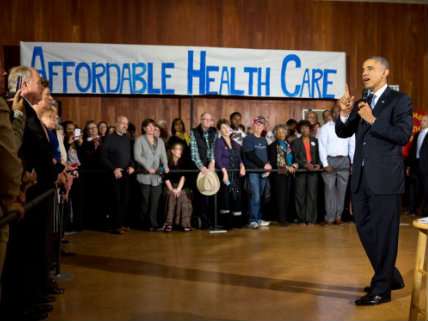The White House Has No Backup Plan If It Loses on Obamacare at the Supreme Court
GOP Senator says President Obama doesn't believe there's a need for a King v. Burwell contingency plan.

In March, the Supreme Court is set to hear arguments in King v. Burwell, a case challenging the Obama administration's decision to allow subsidies into the 36 health insurance exchanges it runs under the law.
The administration argues that Congress intended for subsidies to be available in both state and federally run exchanges; the challengers argue that text of the law, which says that subsidies can only flow through an "Exchange established by a State," prohibits subsidies in federal exchanges.
In recent weeks, the administration's supporters have highlighted a number of estimates of how big the effects would be if the Supreme Court ruled against the administration; millions who now get subsidized insurance through the federally run exchanges could lose their subsidies.
So what happens if the administration loses? This seems like an important question, but publicly, at least, the administration is giving little indication that it has developed any backup. And in a meeting with members of Congress yesterday, President Obama reportedly indicated that the administration was not working on alternatives.
"Sen. John Barrasso (R-Wyo.) says that at a roundtable discussion with congressional leaders he asked Obama why the administration hasn't informed the public that subsidies are an endangered species," reports this morning's Politico Pulse newsletter. "The president replied that he doesn't anticipate the need for a contingency plan."
That's in keeping with the administration's M.O. so far, which prioritizes displays of confidence that they will emerge victorious on the case. But it's a somewhat awkward fit with all the warnings of how disastrous a loss could be.
The administration's lack of public contingency planning, however, creates an opening of sorts for Republicans in Congress who back the challengers. As Georgetown Law Professor Randy Barnett wrote recently in USA Today, "Supreme Court justices are reluctant to invalidate a law on which many relied. It will be far easier for the justices to enforce the law's existing language if they know there is a viable alternative that can be enacted by both houses of Congress and signed by the president within a week of their ruling."
I have argued that the Supreme Court should consider the legal merits of the administration's decision to authorize subsidies without regard to the impact, but Barnett is almost certainly right that the potential impact will at least be part of the discussion. It will be noted and known, even if it is not exactly determinative.
Given that consideration, the GOP should take the administration's lack of revealed contingency planning as an opportunity to work toward the Obamacare alternative the party has promised for so long. The administration has declined to answer the question of what would happen if it loses; those backing the challengers shouldn't ignore it.


Show Comments (115)